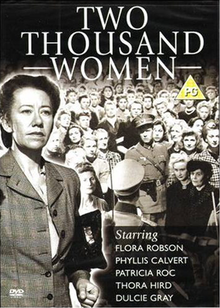Two Thousand Women
| Two Thousand Women | |
|---|---|
 |
|
| Directed by | Frank Launder |
| Produced by | Edward Black |
| Screenplay by | Frank Launder Sidney Gilliat Michael Pertwee |
| Starring |
Phyllis Calvert Flora Robson Patricia Roc |
| Music by | Hans May |
| Distributed by |
Gainsborough Studios Ellis Films (US) |
|
Release date
|
6 November 1944 (UK) October 1951 (US) |
|
Running time
|
UK: 97 min. US: 81 min. |
| Country | United Kingdom |
| Language | English |
| Box office | 547,159 admissions (France, 1945) |
Two Thousand Women (1944) is a British comedy-drama war film about a camp of interned British women in Occupied France. Three RAF aircrewmen whose bomber had been shot down enter the camp and are hidden by the women from the Germans.
The film was released in the USA in 1951 in a severely cut-down version under the title of House of 1,000 Women. Per the British Film Institute database, this is the second in an "unofficial trilogy" by Launder and Gilliat of Millions Like Us (1943), Two Thousand Women, and Waterloo Road (1945).
An English novice nun (Patricia Roc) is arrested by the French as a fifth columnist during the 1940 Battle of France. While she is imprisoned, the Germans occupy France and she is sent (without her habit) to an internment camp in a grand hotel at a spa. She journeys to the camp with Freda (a journalist played by Phyllis Calvert), Bridie (a stripper played by Jean Kent), Muriel (Flora Robson) and her female companion Miss Meredith (Muriel Aked). At the camp they meet Maud (Renee Houston) and Mrs Burtshaw (Thora Hird).
The women soon settle into a routine that seems to consist of cleaning the corridors and playing cards.
However, during an air raid an RAF bomber is shot down and two RAF (James McKechnie and Reginald Purdell) and one RCAF (Robert Arden) aircrewmen escape from the Germans by entering the hotel. The women hide the airmen and devise a plan for the men to escape during a concert. In the meantime, one of the internees is revealed to be a Nazi spy.
...
Wikipedia
